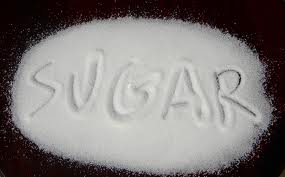Do you ever have a hankering for something sweet? Do you think about it all day until you satisfy it? After you have something sweet do you feel a rush from the sugar, almost euphoric? Research shows that a high intake of carbohydrates, including sugar, releases a feel good chemical in the brain called serotonin. Then within an hour of eating the sugar you start to crash and you feel tired, fatigued, and lethargic and grab another piece of candy or something.
 Maybe you’re sitting there thinking “who cares, what harm can a little sugar really do to me?” Cravings, binge eating, weight gain, and heart disease are just a few problems that sugar can cause when eaten in excess. It also causes an increased risk for type 2 diabetes, elevated triglycerides, and low HDL (good) cholesterol levels. It has also been linked to depression, migraines, poor eyesight, autoimmune diseases such as arthritis and multiple sclerosis, gout, and osteoporosis.
Maybe you’re sitting there thinking “who cares, what harm can a little sugar really do to me?” Cravings, binge eating, weight gain, and heart disease are just a few problems that sugar can cause when eaten in excess. It also causes an increased risk for type 2 diabetes, elevated triglycerides, and low HDL (good) cholesterol levels. It has also been linked to depression, migraines, poor eyesight, autoimmune diseases such as arthritis and multiple sclerosis, gout, and osteoporosis.
Twenty years ago the average person consumed about 26 pounds of sugar per year. According to the USDA, today the average American consumes over 135 pounds of sugar a year. That’s about 22 teaspoons of added sugar daily, the equivalent of 350 calories which means over 8,000 teaspoons a year. That’s double the recommended amount. The American Heart Association recommends that we limit our daily sugar consumption to 7% or less of our daily calorie intake. That’s about 6 teaspoons (100 calories) for women and 9 teaspoons (150 calories) for men. One 12 ounce can of regular soda contains 8-10 teaspoons of sugar, and a glazed donut contains 6 teaspoons.
At least half of the sugar we consume comes from high-fructose corn syrup found in fat-free foods like salad dressings, soft drinks, fruit drinks, and sports drinks. The rest is in our diet from foods like ketchup, teriyaki sauce, chocolate milk, cookies, cakes, ice cream, and cereals. And even when you think you’re eating “healthy”, foods like yogurt and instant oatmeal can pack as much as 20-30 grams (5-7 teaspoons).
Wow looks like we have some work to do! So the next time you get a sweet-tooth craving, grab a piece of fruit or even a glass of water. Research also shows that the less you eat sugar, the less you crave it! Making a few small changes, including reducing your sugar intake, will help YOU get to the core of your fitness and weight loss goals!
